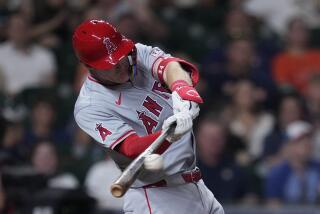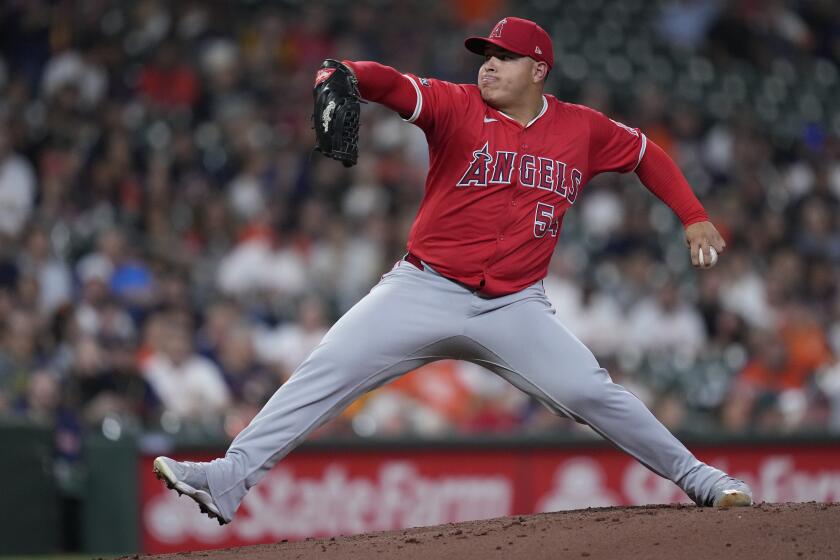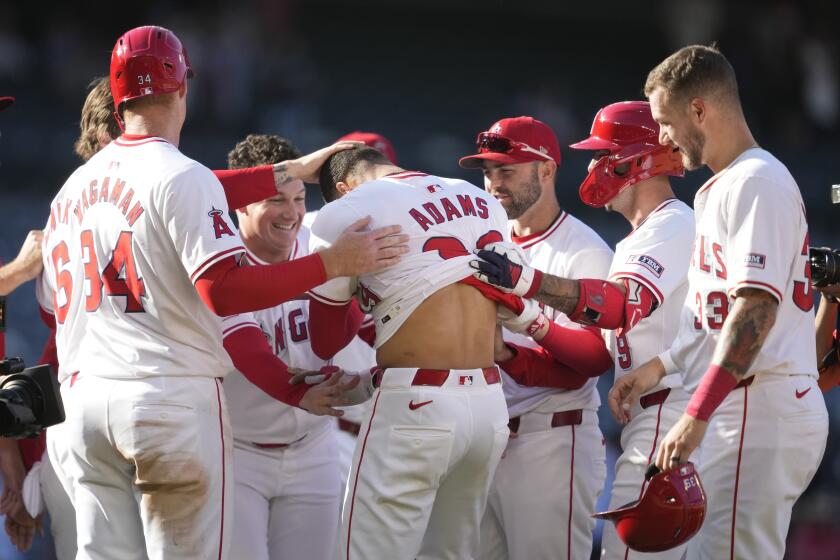Orange County judge to weigh change of venue in trial of man accused in Adenhart death
In life, Nick Adenhart was a little-known rookie pitcher with a strong work ethic and a powerful arm.
But in death, he has become an icon, a “fallen angel,” according to fans. Adenhart, 22, was killed in an April 2009 car accident by a suspected drunk driver, hours after his first start of the season for the Angels, a game in which he threw for six scoreless innings.
Now, as the trial of the accused driver is set to start in Orange County, a judge must decide whether Andrew Thomas Gallo can get a fair trial in the county where the home team lost a hero. On Friday, Superior Court Judge Richard Toohey is expected to hear from the prosecution, defense and the victims’ families before deciding whether to grant Gallo’s request for a change of venue. Also killed in the accident were Adenhart’s friends Henry Pearson and Courtney Stewart. A third friend, Jon Wilhite, was severely injured.
Gallo is charged with three counts of murder, driving under the influence, hit and run and driving with a suspended license. According to prosecutors, Gallo ran a red light and crashed into a car driven by Stewart at a Fullerton intersection. He had a blood-alcohol level of 0.19% — more than twice the legal limit — when he was tested two hours later.
After the crash, Gallo’s mug shot was posted on the Internet as the “guy who killed Nick Adenhart.” Internet comments condemned Gallo, calling him a “pathetic excuse for a human being” and a “drunken low-life.”
Given the glut of media attention and the Angels’ popularity, keeping the trial in Orange County would irreparably harm Gallo’s chance for a fair trial, said defense attorney Jacqueline Rubio.
Before he became a household name, Adenhart was a disciplined and quiet young man who spent years working his way through the minor leagues and struggled with an injured arm. After the baby-faced pitcher’s first major league game in 2008 lasted just two innings, Adenhart told reporters he had let down the team.
Angels Manager Mike Scioscia put it this way: “He just wasn’t some extreme talent that was blessed,” he said. “He fought to be here.”
Something about his story struck a chord even among those who pay little attention to the game. A makeshift shrine of flowers, red caps, rally monkeys and hand-written notes blossomed outside Angel Stadium after Adenhart’s death. People repeated the story of how Adenhart had asked his father to come to the game, saying something special was going to happen.
The shrine grew for months, and a photo of Adenhart was placed on the fence at the stadium. When the team won the American League West title last year, the players gathered before the photo, bowed their heads and touched it. In April of this year, the Angels presented the team’s best pitcher from the previous season with the Nick Adenhart Award, a bronze statue of Adenhart following through on a pitch.
Adenhart’s death, wrote defense attorney Rubio in her 36-page motion, “captured the hearts of every Angels fan, who felt, with good reason, that they had lost a friend as well as a hero in Nick Adenhart.”
“It also,” she wrote, “inspired much hate for Andrew Gallo.”
But Orange County Deputy Dist. Atty. Susan Price said jurors won’t necessarily be swayed by Adenhart’s celebrity.
“People can separate what they gather through the media from the evidence that would be presented in a court room,” she wrote.
Whether the motion will succeed is unclear, but similar motions in high-profile cases haven’t always been successful. In 2008, a federal judge refused to move the trial of former Orange County Sheriff Michael S. Carona even after a local radio talk show urged potential jurors to lie to get on the jury then vote to convict him.
The victims’ families said they hope that a change can be avoided.
“As a family, we’re not really seeking closure to this,” said Nigel Pearson, whose son Henry, a 25-year-old law school student who was also building a sports management business, was also killed in the crash. “I think that’s too much to expect from the trial. But at least it would be a significant step in the long road to recovery.”
Mike Fell, an attorney who represents Wilhite, who survived the crash, and the other victims’ families, said his clients are hoping the judge denies the motion. He knows that Adenhart’s celebrity will be a factor, but he worries that the other victims will be lost in the story.
“Nick was an amazing baseball player with an amazing future,” he said, but “there were really three amazing people who were killed that night. And one amazing person who whose life will physically and emotionally never be the same.”
More to Read
Go beyond the scoreboard
Get the latest on L.A.'s teams in the daily Sports Report newsletter.
You may occasionally receive promotional content from the Los Angeles Times.






